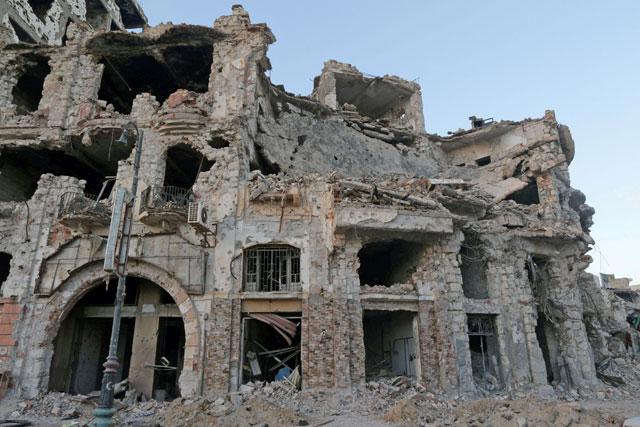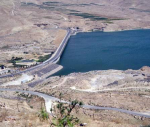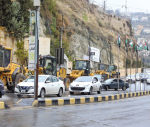You are here
Benghazi’s displaced: a litmus test for Libya
By Reuters - May 17,2018 - Last updated at May 17,2018

A historic building, that was destroyed during the three-year conflict, is seen in Benghazi, Libya, on February 28 (Reuters photo)
TRIPOLI, Libya — With two brothers in jail, the family house gone and her papers lost in the battle for Benghazi, Fatma is finding it hard to restart her life at the other end of Libya but impossible to imagine going back.
The 26-year-old is one of around 185,000 Libyans the United Nations has recorded as displaced by the turmoil in the North African country, living in the capital Tripoli and barred from her eastern home city, where a rival administration holds sway.
Former Benghazi residents are not the only ones driven from their homes: fighting turned the 6 million strong country into a patchwork of rival fiefdoms after Muammar Qadhafi was ousted by a pro-democracy uprising in 2011.
But they make up a large proportion of the displaced and their fate is central to the future stability of Libya and the wider region, where Al Qaeda and Daesh have exploited political alienation.
The Benghazi displaced consist of radicals and more moderate opponents of Khalifa Haftar, a commander who controls much of eastern Libya and has an eye on the rest.
They have all been labelled terrorists by Haftar and his supporters, complicating the reconciliation the United Nations hopes to advance by helping Libya hold elections this year.
"My family was in opposition to Haftar so it got too dangerous for us," Fatma said in phone interview, asking, like others interviewed, to be cited with her first name only, fearing reprisals.
Haftar turned against Qadhafi along with extremist and other allied fighters and then, once Qadhafi had gone, expelled his former allies, some of whom viewed him as a throwback to one-man rule.
More than 100,000 people were displaced, according to UN estimates, in fighting between the former allies that broke out in 2014 and destroyed entire neighbourhoods before it ended last July, when Haftar declared victory.
He now leads a government in competition with a UN-backed administration in Tripoli and is weighing whether to run for president if and when elections are held.
He is backed by Egyptian President Abdel Fattah Al Sisi, who also has military roots. Sisi has cracked down on political Islamists, who he brands terrorists, and faces growing attacks, claimed by Daesh militants, on soldiers and civilians in Sinai.
Night flight
Fatma fled in 2014 with her parents and siblings, driving through the night to Misrata, a city in western Libya some 800km away which supported the oppositionists opposing Haftar and where some Benghazi business people have roots.
One of her brothers was arrested as he had been a member of Ansar Al Shariya, a militant group which fought Haftar and which Washington says was behind the 2012 Benghazi attack that killed the US ambassador.
Many Ansar Shariya members ended up with Daesh, but the battle for Benghazi also drew in more moderate forces opposed to Haftar. Western diplomats say this group might get radicalised if denied the right to return.
"If the Benghazi displaced don't find a 'political home', then they will become a source of new dissent," one diplomat said.
Haftar has presented himself to foreign powers as a bulwark against terrorism and is popular among many in eastern Libya who credit him with ending a rise in militancy.
His opponents accuse him of resurrecting an authoritarian state in the east, where he controls the OPEC member's key oil export ports.
Fatma's family rushed to sell her house to a neighbour; the Tripoli-based council of displaced from Benghazi says other homes were taken by the families of forces linked to Haftar's Libyan National Army (LNA).
Mustafa Sagizly, a former IT entrepreneur and Haftar critic who left Benghazi in June 2014, said his was among them. "My villa is now inhabited by four families," he said by telephone from Geneva, sharing pictures of his sprawling former home and saying he had not been back for fear of arrest.
Hanan Salah, senior Libya researcher at Human Rights Watch, said the scale of property seizures "appeared to be substantial".
"Families or individuals perceived to oppose the Libyan National Army paid dearly and were hunted; scores remain detained, were disappeared, tortured or even killed and their properties were confiscated," she said.
Ahmed Mismari, spokesman for Haftar's LNA, denied houses had been seized. Residents loyal to Haftar said some houses abandoned by people they described as terrorists were now inhabited by families whose own homes had been destroyed.
"Those families who run away from Benghazi, their sons were from terrorist groups," said Mismari. "Their sons carried out acts of kidnapping, killing, assassination, explosions and destroyed families."
He said the displaced families could come back as part of national reconciliation provided their cases were settled from a legal point of view involving community elders.
Reconciliation
Haftar has threatened severe consequences for refusing to return houses to their owners, but critics say he is unable to control all LNA forces, a mixture of soldiers, tribesmen and youth who joined up.
"I don't have a problem with Haftar but I fear going back because in Benghazi everyone who left in 2014 is seen as 'Daesh'," said an oil engineer called Mahmoud who hails from the same tribe as Haftar.
He had not joined oppositionists but left the city for Tripoli in 2014 when fighting hit his district. "My house got destroyed by an air strike and I also have an apartment which some people have occupied."
The United Nations has begun meetings to bring together rival communities in various parts of Libya and pave the way for presidential and parliamentary votes it hopes will be held soon.
Tarek Orafi, head of the Benghazi municipal council replaced by Haftar by a military governor, said only a few families who fled the city in 2014 had gone back. A UN-led group of aid agencies involved in protection of civilians in Libya put the number of people still displaced from Benghazi inside Libya at 27,000 but Orafi said others had gone abroad like Sagizly, many to Turkey.
The council has registered some 13,000 displaced families but its members said the number was higher, since many people did not want to add their names, fearing reprisals.
Reuters did meet some Benghazi residents living in Tripoli who travel home without getting questioned, however.
Orafi said those arriving in western Libya find themselves in legal limbo. The east refuses to send documents such as birth certificates, often citing ongoing security investigations, and officials in western Libya will not issue new ones without them.
"I couldn't enrol at the [state] Tripoli university," said Fatma. "I lost my university documents."
Her father has been unable to get his public salary routed from his old Benghazi account, now unaccessible, to a new one in Tripoli, a problem reported by other displaced people too. Another brother could not marry as his civil registry is in Benghazi, another problem described by others.
Parts of western Libya became less welcoming after suicide bombings began in 2015 — another of Fatma's brothers was detained in Misrata after a video surfaced where he voiced support for Ansar Al Shariya, she said.
Alongside the legal struggles is the trauma of feeling cut off from a home city just a one-hour flight from the capital.
"I had to restart my life in Tripoli from zero," said a 26-year-old female friend of Fatma who only gave her family name, Saghili. She fled with her mother and sisters in 2014 after her home was destroyed in an air strike.
"We manage financially but I miss my friends in Benghazi, my house and my bed," she said. "But I fear going back."
Related Articles
BENGHAZI, Libya — Eleven soldiers were killed and 55 wounded on day one of an offensive against extremist groups in Benghazi, the news agenc
TUNIS — Armed groups, some linked with prominent Libyan commander Khalifa Haftar, are preventing thousands of displaced families from return
BENGHAZI, Libya — Forces loyal to Marshal Khalifa Haftar, who control large parts of eastern Libya, said on Thursday they were locked in fie
















